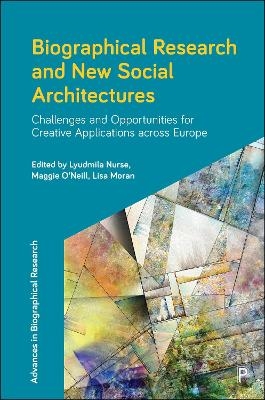
Biographical Research and New Social Architectures
Policy Press (Verlag)
978-1-4473-6890-8 (ISBN)
What are the building blocks of the new societal architectures after COVID-19? What are the evolving lifestyle patterns, social connections and relationality, and what can biographical research bring to explore these unprecedented societal circumstances?
This first book in the new series Advances in Biographical Research focuses on the place of biographical research in analysing and shaping social futures characterised by physical distancing and isolation, social fragmentation, trauma and vulnerability, including breaks in biographical trajectories.
Written by experienced and early career researchers, it demonstrates how biographical research responds to new societal architectures: theoretically and empirically.
Lyudmila Nurse is Honorary Research Fellow in the Department of Education at the University of Oxford, and Research Director of Oxford XXI think tank. Maggie O’Neill is Professor in Sociology and Criminology and Director of the Institute for Social Sciences in the 21st Century and UCC Futures: Collective Social Futures at University College Cork. Lisa Moran is Dean of Graduate Studies and Head of the Graduate School at the Technological University of the Shannon.
Overview: Theorising the New Social Futures through the Lens of the Past.
Part I Facing the New Turn in Biographical Research: Methodological Adaptations to the New Social Context
Chapter 1. Creative Applications of Biographical Research: Time–Space Interactions in Walking Biographical Methods – Maggie O’Neill and Lyudmila Nurse
Chapter 2. Touching from a Distance: Gaining Intimacy with Research Participants during the COVID-19 Pandemic – Ana Caetano, Magda Nico, Anabela Pereira and Sónia Bernardo Correia
Chapter 3. Collaborative (Auto)ethnography (CAE) for Researching (in) New Social Contexts: Reflections from COVID-19 Lockdown Times in Europe – Lisa Moran and Kateřina Sidiropulu-Janků
Chapter 4. Technological Mediation of Biographical Research and Its Risks – Jerzy Stachowiak
Part II Creative, Inter-disciplinary and Comparative Approaches
Chapter 5. Walking New Horizons for Critically Reflexive Pedagogy and Research- Jerry O’Neill
Chapter 6. The ‘New Normal’ for Oral History? Challenge and Opportunities of Interviewing During the Global Pandemic and Its Aftermath – Jakub Gałęziowski
Chapter 7. Relations Between Biographical Dispositions and Teaching Strategies of Computer Science Teachers During Lockdown: Application of Triangulation in Biographical Research – Andre Epp
Part III the Multidimensionality of Vulnerability and Risk in Biographical Research: Ethics, Vulnerabilities and Trauma
Chapter 8. Sharing Biographical Vulnerabilities in the Focus Group Setting: Building Solidarities, De-individualising Racism and Protective Silences-Tamsin Barber and Diana Yeh
Chapter 9. Revising the Researcher’s “Borders”: The Narrator Demands Expansion of the Researcher’s “Presence” in Storytelling – Oksana Žabko
Chapter 10. – Research Opportunities and Challenges During COVID-19 – The Case of Volunteer Firefighters – Fabienne Seifert (Germany)
Chapter 11. Challenging Inequalities with Critical Biographical Research Methods – Ciara Bradley & Lynsey Kavanagh
Epilogue: Biographical Futures: Responding to the New Challenges – Lyudmila Nurse, Maggie O’Neill & Lisa Moran
| Erscheinungsdatum | 23.04.2024 |
|---|---|
| Reihe/Serie | Advances in Biographical Research |
| Co-Autor | Tamsin Barber, Ciara Bradley, Andre Epp, Jakub Gałęziowski, Sónia Bernardo Correia |
| Zusatzinfo | 5 Illustrations, black and white |
| Sprache | englisch |
| Maße | 156 x 234 mm |
| Themenwelt | Mathematik / Informatik ► Informatik ► Theorie / Studium |
| Sozialwissenschaften ► Soziologie ► Allgemeines / Lexika | |
| Sozialwissenschaften ► Soziologie ► Empirische Sozialforschung | |
| ISBN-10 | 1-4473-6890-8 / 1447368908 |
| ISBN-13 | 978-1-4473-6890-8 / 9781447368908 |
| Zustand | Neuware |
| Informationen gemäß Produktsicherheitsverordnung (GPSR) | |
| Haben Sie eine Frage zum Produkt? |
aus dem Bereich


